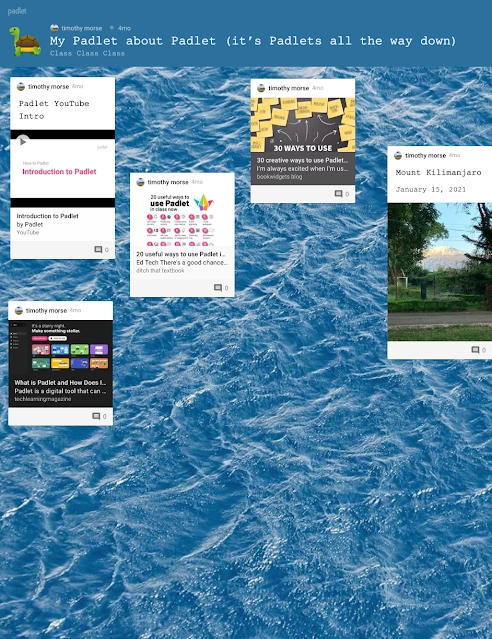Assessment of Assessors’ Assessment of my Assessments
Formative Student Assessments
The focus of this post will be on Formative Assessments (as opposed to Summative Assessments - for definitions of each see: https://www.bookwidgets.com/blog/2017/04/the-differences-between-formative-and-summative-assessment-infographic )
Formative Assessments are the point at which students and teachers exchange information on: “how learning is going.” Students and teachers get a sense of where they stand; students in relation to the materials being taught and their rank amongst their peers, and teachers, on their pedagogical effectiveness. Both should gain insight into their relative strengths and weaknesses, at a particular point in time, on a particular part of the subject being taught. Each should then be able to assess where to direct efforts at strengthening understanding.
Kahoot as a tool for Formative Assessment:
I am drawn to Kahoot because it reminds me of the video entitled “Future Learning” - https://youtu.be/qC_T9ePzANg , especially Mr. Ntiedo Etuk’s presentation which starts at about the “3:10” mark.
Mr. Etuk emphasizes motivating students and relevance. Video games (and games in general) do motivation and relevance well - most puzzle games make solving a puzzle a necessary step in order to progress (or obtain a “treasure”.) Games make failure an expected part of the process and re-attempting a failed task a natural part of ‘learning’ and FUN!, to boot.
This of course is fundamental to a ‘growth’ mindset as noted here: (“Sprouts” YouTube Channel, “Gowth Mindset v. Fixed Mindset) https://youtu.be/KUWn_TJTrnU
Kahoot neatly ‘gamifies’ formative assessment in a way that (hopefully) motivates and is relevant - to both the participating students and the data-collecting teacher. It also happens in an immediate way that satisfies what I think are modern students’ expectations for the time it should take to get ‘feedback’. It is also easily differentiable for students who need a slower pace (by changing the time allotted to provide an answer) or who are not native English speakers (by permitting integration of visual cues, use of bolded text for emphasis etc.)
Mindmaps (MindMeister) as a tool for Formative Assessment:
Online mindmap apps present some obvious challenges for use as a tool for assessment of student learning. Any app you select must be compatible across multiple electronic “ecosystems” and all participants must have reliable and speedy access to the internet. Let’s assume you have that, for our purpose.
Mindmaps are great for engaging students in a visual way as they easily incorporate images and weblinks. It has no real gaming aspect, per se, but students get to see in real-time their peers’ contributions, which can lead to a collaborative approach. I think a Mindmap assessment, properly designed, could build teamwork, within a class (if devolution into a competitive, speed effort is guarded against).
A potential problem is matching contributions to the student that made them. It also might result in one super-engaged student putting in so many ideas that it becomes more more their Mindmap than a group effort. But if you establish a limit of 1 -3 contributions and require/create a way for IDing each participant's contribution it can work. It also might attain that elusive “fun” factor!
My Assessment of Peers’ Assessments of my Formative Assessments (Yes, it’s assessing all the way down)
My peer reviewers confirmed that formative assessments are good tools to confirm depth of comprehension and understanding as well as being good at capturing students’ grasp of more obvious facts. Formative assessments should do both things but mine tended to assess more of a surface skimming of a topic and not enough on assessing more nuanced student comprehension. This might be a failure that impacts particularly on the class’ more advanced students. To reframe it in terms of gaming: a game that is too easy is boring. It will not motivate and it will not seem as relevant. Boredom and learning cannot coexist. It is, therefore, important to design formative assessments that:
Are fun;
Capture both breadth and depth of understanding;
Present a challenge to advanced learners ; and
Are differentiable for students with special needs


Comments
Post a Comment